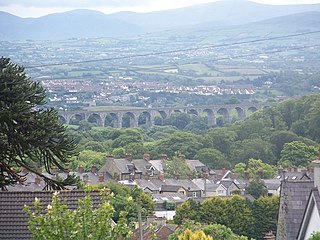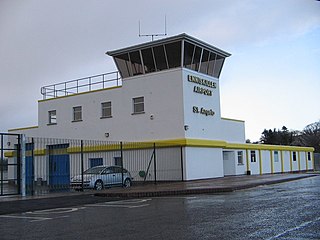
Enniskillen is a town and civil parish in County Fermanagh, Northern Ireland. It is located almost exactly in the centre of the county, between the Upper and Lower sections of Lough Erne. It had a population of 13,823 in the 2011 census. It was the seat of local government for the former Fermanagh District Council, and is the county town of Fermanagh as well as its largest town.

The Irish Republican Army (IRA), also known as the Provisional Irish Republican Army was an Irish republican paramilitary organisation that sought to end British rule in Northern Ireland, facilitate the reunification of Ireland and bring about an independent republic encompassing all of Ireland. It was the biggest and most active republican paramilitary group during the Troubles. It saw itself as the successor to the original IRA and called itself simply the Irish Republican Army (IRA), or Óglaigh na hÉireann in Irish, and was broadly referred to as such by others. The IRA was designated an unlawful terrorist organisation in the United Kingdom and an unlawful organisation in the Republic of Ireland.
The Real Irish Republican Army or Real IRA (RIRA), also called the New IRA (NIRA) since 2012, is a dissident Irish republican paramilitary group which aims to bring about a united Ireland. It formed in 1997 following a split in the Provisional IRA by dissident members, who rejected the IRA's ceasefire that year. Like the Provisional IRA before it, the RIRA sees itself as the only rightful successor to the original Irish Republican Army and styles itself as "the Real Irish Republican Army" in English or Óglaigh na hÉireann in Irish. It is an illegal organisation in the Republic of Ireland and designated as a proscribed terrorist organisation in the United Kingdom and the United States.

The Troubles was an ethno-nationalist conflict in Northern Ireland during the late 20th century. Also known internationally as the Northern Ireland conflict, it is sometimes described as an "irregular war" or "low-level war". The conflict began in the late 1960s and is usually deemed to have ended with the Good Friday Agreement of 1998. Although the Troubles primarily took place in Northern Ireland, at times the violence spilled over into parts of the Republic of Ireland, England, and mainland Europe.

The Security Service, also known as MI5, is the United Kingdom's domestic counter-intelligence and security agency and is part of its intelligence machinery alongside the Secret Intelligence Service (MI6), Government Communications Headquarters (GCHQ) and Defence Intelligence (DI). MI5 is directed by the Joint Intelligence Committee (JIC), and the service is bound by the Security Service Act 1989. The service is directed to protect British parliamentary democracy and economic interests, and counter terrorism and espionage within the UK.

Warrenpoint is a small town and civil parish in County Down, Northern Ireland. It lies on the northern shore of Carlingford Lough and is separated from the Republic of Ireland by a narrow strait. The town sprang up within the townland of Ringmackilroy. It is locally nicknamed "The Point".

Clones is a small town in western County Monaghan, Ireland. The area is part of the Border Region, earmarked for economic development by the Irish Government due to its currently below-average economic situation. The town was badly hit economically by the partition of Ireland in 1921 because of its location on the border with County Fermanagh in Northern Ireland. The creation of the Irish border deprived it of access to a large part of its economic hinterland for many years. The town had a population of 1,680 at the 2016 census.

Bessbrook is a village in County Armagh, Northern Ireland. It lies about three miles (5 km) northwest of Newry and near the Newry bypass on the main A1 Belfast-Dublin road and Belfast-Dublin railway line. Today the village of Bessbrook straddles the three townlands of Maghernahely, Clogharevan and Maytown. Bessbrook is near Newry railway station.
Events from the year 1921 in Ireland.

The Royal Irish Regiment is an infantry regiment of the British Army. The regiment was founded in 1992 through the amalgamation of the Royal Irish Rangers and the Ulster Defence Regiment. Their oldest predecessor; the 27th Regiment of Foot; was first raised in June 1689 to fight in the Williamite War in Ireland. Other notable regiments in their lineage include the Royal Inniskilling Fusiliers, Royal Irish Rifles and the Royal Irish Fusiliers.

The Irish Republican Army (IRA) are paramilitary movements in Ireland in the 20th and the 21st century dedicated to Irish republicanism, the belief that all of Ireland should be an independent republic from British rule and free to form their own government. The original Irish Republican Army formed in 1917 from those Irish Volunteers who did not enlist in the British Army during World War I, members of the Irish Citizen Army and others. Irishmen formerly in the British Army returned to Ireland and fought in the Irish War of Independence. During the Irish War of Independence it was the army of the Irish Republic, declared by Dáil Éireann in 1919. Some Irish people dispute the claims of more recently created organisations that insist that they are the only legitimate descendants of the original IRA, often referred to as the "Old IRA".
The playwright and former IRA member Brendan Behan once said that the first issue on any Irish organisation's agenda was "the split". For the IRA, that has often been the case. The first split came after the Anglo-Irish Treaty in 1921, with supporters of the Treaty forming the nucleus of the National Army of the newly created Irish Free State, while the anti-treaty forces continued to use the name Irish Republican Army. After the end of the Irish Civil War (1922–23), the IRA was around in one form or another for forty years, when it split into the Official IRA and the Provisional IRA in 1969. The latter then had its own breakaways, namely the Real IRA and the Continuity IRA, each claiming to be the true successor of the Army of the Irish Republic.

The Royal Inniskilling Fusiliers was an Irish line infantry regiment of the British Army in existence from 1881 until 1968. The regiment was formed in 1881 by the amalgamation of the 27th (Inniskilling) Regiment of Foot and the 108th Regiment of Foot.

Aughnacloy, sometimes spelt Auchnacloy is a village in County Tyrone, Northern Ireland. Close to the border with County Monaghan, the village is about 20 km southwest of Dungannon, and 7 km southeast of Ballygawley. It is situated in the historic barony of Dungannon Lower and the civil parish of Carnteel. In the 2001 Census it had a population of 801.
2BE was the call sign of the first official radio station to broadcast in Northern Ireland. Operated by the British Broadcasting Company, it started transmissions from Belfast on 15 September 1924 using a wavelength of 435 m.
Major Thomas "Robin" Valerian Dixon, 3rd Baron Glentoran, is a former British bobsledder and Northern Irish politician, known as Robin Dixon. He is a former Conservative Party Shadow Minister for the Olympics.

Cullaville or Culloville is a small village and townland near Crossmaglen in County Armagh, Northern Ireland. It is the southernmost settlement in the county and one of the southernmost in Northern Ireland, straddling the Irish border. In the 2001 Census it had a population of 400 people. The village is on a busy crossroads on the main Dundalk to Castleblaney road ; three of the roads lead across the border and the fourth leads to Crossmaglen.

Enniskillen/St Angelo Airport is located 3 nautical miles north of Enniskillen, County Fermanagh, Northern Ireland. Enniskillen/St Angelo Aerodrome has a CAA Ordinary Licence that allows flights for the public transport of passengers or for flying instruction as authorised by the licensee.

The three Scottish soldiers' murders was an incident that took place in Northern Ireland during The Troubles. It happened on 10 March 1971, when the Provisional Irish Republican Army shot dead three unarmed British Army soldiers of the 1st Battalion, Royal Highland Fusiliers. Two of the three soldiers were teenage brothers; all three were from Scotland. They were murdered off-duty and in civilian clothes, having been lured from a city-centre bar in Belfast, driven to a remote location and shot whilst relieving themselves by the roadside. Three British soldiers had been killed prior to this event; all had been on duty and killed during rioting.

Since the Provisional Irish Republican Army called a ceasefire and ended its armed campaign in 1997, breakaway groups opposed to the ceasefire have continued a low-level armed campaign against the security forces in Northern Ireland. The main paramilitaries involved are the Real IRA, Continuity IRA and Óglaigh na hÉireann. They have targeted the Northern Irish police and the British Army in gun and bomb attacks, as well as with mortars and rockets. They have also carried out bombings that are meant to cause disruption. However, their campaign has not been as intensive as the Provisional IRA's.
















